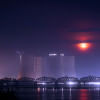RUPPUR NUCLEAR POWER PLANT: BANGLADESH'S POTENTIAL BLACKHOLE

Bangladesh, under the present Awami League government, is about to embark on the Rooppur Nuclear Power Plant (RNPP) project - the largest ever undertaken in the country, in terms of cost, technical complexity and risk profile. Instead of going for a single, smaller nuclear power plant and gathering experience and expertise, Bangladesh is going flat out foolhardily for two large output (1,200 MWe ~ 3,000 MWth) plants, almost simultaneously, at enormous costs! In this article, I will dwell on the costs of the proposed plant comprising two 1,200 MWe VVER reactors and the enormous debt burden that they impose on Bangladesh.
It had been reported in the last two to three days that Bangladesh Atomic Energy Commission (BAEC), on behalf of the Bangladesh government, and Atomstroy Export, on behalf of the Russian government, have signed a contract whereby Russia will provide 90 percent of the anticipated cost of $12.65 billion for the construction of these two reactors in Rooppur, Pabna. The Nuclear Power Company of Bangladesh (NPCB) was set up under the Nuclear Power Plant Act 2015 to run the plant, though the ownership remains with the BAEC and thereby, with the government of Bangladesh. The interest rate for the loan is stated to be LIBOR + 1.75 percent (with the upper ceiling of 4 percent) as per a Bangladesh government source.
However, the trustworthiness of the source cannot be guaranteed, as many Bangladeshi claims had hitherto been found to be either erroneous or deliberately misleading.
What the Bangladesh or Russian government does not say is that it is not a "fixed price" contract but rather a "cost plus" contract. In other words, as the construction work proceeds, the vendor has the right to come up with any cost escalation (plus their profit margin) to be incorporated into the contract amount. Such Russian contracts had ended up in almost doubling the initial amount in the past in other countries. In Iran, a Russian contract to build a 1000 MWe VVER plant in Bushehr (Bushehr 1) had taken more than 20 years (1994 to 2014) to build, and the cost had escalated enormously to the embarrassment of the Iranian government!
It must be appreciated that this anticipated cost is only for the construction of the plant; it does not include fuel costs, operation and maintenance costs, and decommissioning and radioactive waste management cost at the end of its operational life. Depending on the design specification, the plant needs to be shut down for three months in every 18 months for refuelling and maintenance schedules. Nearly one-third of the fuel rods need to be replaced in the refuelling operation and the spent fuel is to be stored on site in a suitably designed fuel pond for a minimum of five years. Another aspect that must be considered is that the decommissioning and radioactive waste management cost is roughly equal to the construction cost and this has not been factored in Bangladesh's cost estimate.
Overall, the cost should include the construction cost ($12.65 billion); maintenance and refuelling cost of, say 26 times, in the life span of 40 years each costing $100 to $150 million at NPV; the operating cost of around $50 million each year of 40 years, interest payment on the capital which is likely to be at least equal to the capital, if not more, as the loan is taken upfront, and, above all, the capital cost is most likely to be well above the initial estimate. Taking all of these cost estimates along with the decommissioning cost and assuming 70 percent of plant availability (the best plant availability by any nuclear plant), the unit cost comes to 11 cent per kWh, which is equal to 8.5 BDT. This cost of generation is at least 60 percent higher than the present retail cost of BDT 5.
All of these calculations are based on a best estimate scenario. The plant may suffer an accident, causing it to be shut down for months, if not years, for repair work. The Fukushima nuclear accident, the Chernobyl accident etc. have caused the plants to be completely written off! When there is an accident, it is not only the plant damage to be considered but also damages to the population, to the country as a whole and even to the surrounding countries are to be considered. These costs can easily run into tens of billions of dollars and can ruin the country.
The legal position of the contract is that Bangladesh will be solely responsible for the repayment of the loan with interests (whatever the amount is taken at any time), even if the plant is mothballed, cancelled or accidentally damaged. The risk is enormous, particularly when the Bangladeshi "experts" seem to be completely clueless.
Many advanced countries like Germany, Italy, Switzerland and so forth have decided to opt out of the nuclear power generation option. It is not because they do not have the resources (which Bangladesh does not have), and it's not because they don't have manpower and skills (which Bangladesh does not have) but because they realise that nuclear power generation risks are unacceptably high. With far less risks – physical as well as commercial – those countries can produce energy through other means such as renewable sources.
One may note that Britain is in the process of setting up a nuclear power plant at Hinkley Point C after nearly 30 years. Bangladesh should obviously not delude itself by saying that if Britain can do it, we must be able to do it. Britain had set up the world's first commercial nuclear power plant more than 60 years ago – even before the Ruppur plant was conceived of in 1961!
But the financial model of the new British nuclear plant is entirely different to Bangladesh's one. A number of nuclear plant designs, submitted by international companies, had been very rigorously scrutinised by British nuclear regulators – the Office for Nuclear Regulation and Environmental Agencies – and finally the design of the EdF(a French national nuclear power company) of EPR (European PWR Reactor) was chosen. The EdF, as the plant owner/operator, will be the majority shareholder and Chinese state sponsored banks will be minority shareholders along with other private shareholders. The British government will not provide any money for the construction, operation, decommissioning etc. of the plant. The commitment on the part of the British government is that it will give subsidy equal to about 8p per unit of supplied electricity. In other words, if after a huge construction cost, the plant is unable to supply any electricity to the national grid, the British government will offer no money to the French company; the British public will thus suffer no losses. The risk to the state is absolutely zero.
Now, consider the Bangladeshi financial model. The loan (90 percent of capital cost) is going to be provided by the Russian government for this 'cost plus' contract. The construction of the plant is to be carried out by the Russian companies, as no Bangladeshi company can do anything except dig soil and put up the boundary fence! The 'cost plus' contracts are regarded as being the most favourable to the contractors as all the financial risks are lumped on the owners. The past performance of such contracts by Russia in other countries shows that the final costs are roughly double than the initial costs! The nuclear regulations are to be provided by the Russians and the Bangladeshi 'regulators' are to be trained by Russia!
With such a contract where all the risks are on Bangladesh, will it be worthwhile to go for a nuclear power plant despite such a lack of preparation and knowledge? The delusion of the concerned authorities was gauged when the minister in charge said a couple of years ago that "the nuclear power will enhance Bangladesh's image abroad". This nuclear plant would possibly be the first in the world to be built primarily for the image rather than for the generation of power!
The writer is a retired nuclear scientist with 35 years of experience in the UK and Europe. He is a Fellow of the British Nuclear Institute.

 For all latest news, follow The Daily Star's Google News channel.
For all latest news, follow The Daily Star's Google News channel. 








Comments